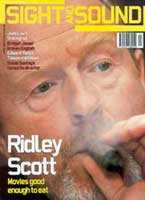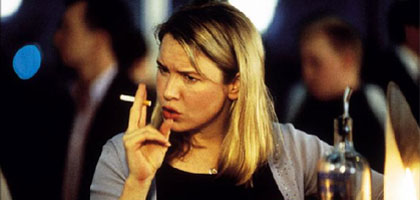
Thigh Society
Film of the Month: Bridget Jones's Diary

Bridget Jones's Diary begins with its heroine (Renée Zellweger) casually dropping coins in a homeless couple's cup on her way to work. As she walks off, glowing with charitable pride, we hear one of them say, "What a lovely, caring person!" "Yes," says the other, "shame about the thighs."
It's a throwaway gag based on Bridget's belief that the whole world is as conscious of her weight as she is, but one that swiftly establishes the film's playful disregard for realism. There's a thin trickle of non-diegetic devices throughout. Later a train announcer with a Caribbean accent also discusses Bridget's thighs, occasional fantasy sequences crop up - showing, for instance, Bridget being eaten by Alsatians, the price she imagines she'll pay for remaining single - and subtitles monitor her weight and daily cigarette and alcohol consumption. The objective seems to be to find a correlative for the original book's diary form and to get across a sense of Bridget's low self-image - sympathetic at first, yet shading almost imperceptibly into a whiny narcissism.
It's a narrow spectrum to work in, and both film and book pull it off by dint of unforced charm and steely old-fashioned farce. It's lucky neither Bridget nor the film take themselves the least bit seriously. Sure, the movie could claim a certain literary pedigree since the novel was a West London update of Jane Austen's Pride and Prejudice. Boozy, party-girl, size-12 publishing publicist Bridget meets wealthy human-rights lawyer Mark Darcy (Colin Firth) who snubs her at first but then comes to recognise her endearing charms. Bridget snubs Darcy back, having been prejudiced against him by her slimy boss Daniel Cleaver (Hugh Grant) who claims Darcy stole his girlfriend. True love wins out in the end via culinary disaster and regular bouts of public embarrassment.
Bridget Jones's Diary has been lumped by cultural commentators with the recent crop of chick-lit, chick-flicks and female-oriented sitcoms. Its most obvious coevals, in terms of popularity at least, are the television series Ally McBeal and Sex and the City, the latter based on a newspaper column written by Candace Bushnell just as Bridget was based on a column author Helen Fielding penned for the Independent. All concern successful career girls angsting to varying degrees over the unattainable goal of 'having it all', the surface farce merely the exposed tip of an iceberg of despair under threat from global meltdown.
But it makes all the difference that Bridget is British and a single discrete story while the two others are American and ongoing series. Given that the film was partly backed by a US distributor (Miramax), it's a welcome surprise that so much of the novel's cultural specificity has survived. Bridget still weighs herself in stones and what little psychobabble she espouses is treated with audible irony. The characters in Ally McBeal and Sex and the City seem to cruise effortlessly through their successful and glamorous careers, spending most of their time shopping and moping about relationships (Ally's courtroom time is little more than a prompt for the next epiphany about love, sex or whatever, while Carrie in Sex and the City cannibalises her own and her friends' misadventures to sustain her column). But Bridget's career mishaps are as foregrounded as her relationship fiascos. After the disastrous affair with Daniel makes working with him intolerable, she unsuccessfully tries to bluff her way through a series of interviews, only to get a job on a television show by telling the truth about why she left her last post. (Her new boss reassures her: "At Sit Up Britain, no one ever gets fired for shagging the boss. It's a principle.") Her struggle up the greasy career pole is literalised in one gag when she slips down a fireman's pole live on air, her arse descending calamitously on top of a cameraman, shown as a POV shot.
It would be all too easy for British commentators, with inverted smug pride, to point to Bridget Jones as an example of how the British accept, even celebrate failure, as in Notting Hill, another Brit RomCom written by Bridget Jones' co-screenwriter Richard Curtis. But doesn't the unambiguously happy ending negate such a reading? In the end, Bridget gets her man - and to echo Billy Joel, one who loves her just the way she is - in contrast with the US programmes whose open-endedness ensures the girls never wind up with what they really want. They may have scads of money and to-die-for apartments, but they never hold on to a man for more than a few episodes, let alone past the end of a season.
The film's celebration of Bridget's success in the face of hopeless ineptitude is in contrast with the eminent pedigrees of some of the cast and film-makers. A mild puncturing of the fictional illusion is being essayed with the casting of Colin Firth as Darcy. Firth played Austen's haughty hero Mr Darcy in the BBC adaptation of Pride and Prejudice, a show the book's Bridget watches compulsively and which was written by Andrew Davies, a co-author of the Bridget Jones screenplay. In the book, she and a friend have "a long discussion about the comparative merits of Mr Darcy and Mark Darcy, both agreeing Mr Darcy was more attractive because he was ruder but that being imaginary was a disadvantage that could not be overlooked."
As in the book, many of whose characters Fielding allegedly based on friends and acquaintances, the real and the imaginary are covertly blurred here. In Fielding's sequel The Edge of Reason Bridget interviews Firth himself for the Independent. Meanwhile, Hugh Grant, whose real-life dalliance with a Hollywood hooker is snickered over in the book, plays the false-start love interest Cleaver and is given the shockingly self-immolating line, "I'm a terrible disaster with a posh voice and a bad character." Salman Rushdie and Jeffrey Archer appear as themselves. Richard Curtis is Helen Fielding's ex-boyfriend. The firm owned by Matthew Freud, the brother of Curtis' wife Emma Freud, is handling the film's UK publicity. Sharon Maguire, the model for one of Bridget's best friends Sharon, is the film's debut director.
It would be easy to envy them as so many rich Notting Hill luvvies and to write off Bridget Jones as an exercise in preening nepotistic narcissism. Except that's it's really rather good - funny, engaging and winning in its self-deprecating modesty, albeit in a big-budget sort of way. It's hard not to like a film where the characters pause during a hilariously clumsy fight in a restaurant to join in singing 'Happy Birthday' to another customer, or mime drunkenly to 'All by Myself' using a bread stick as a mike. Bridget Jones's Diary has a gift for bathetic deflation. When Bridget and Daniel go away for a dirty weekend, what sounds like sex talk ("Fuck me, that's tight") in the bedroom is revealed through a slow track to be nothing more than Daniel's reactions to a game of snooker on television.
The only real concession to the American audience is the casting of Renée Zellweger as Bridget, rather than a British actress such as Kate Winslet or Helena Bonham Carter, but even this works to the film's advantage. Zellweger seems more of an outsider trying to fit in, with traces of American gaucheness poking through the skin of the performance and the accent just a little too studiedly posh. She has fine comic timing, as does Maguire, who shows a knack for the ironic counterpointed edit, contrasting Bridget's voiceover pledges to sobriety one minute with her falling drunkenly out of a cab the next. Maguire's only glaring thud is the use of slow motion at moments of revelation, which strain too hard for poignancy. Otherwise, the film slips down as easily as Chardonnay, probably not v. good for one, but tasty nonetheless.
